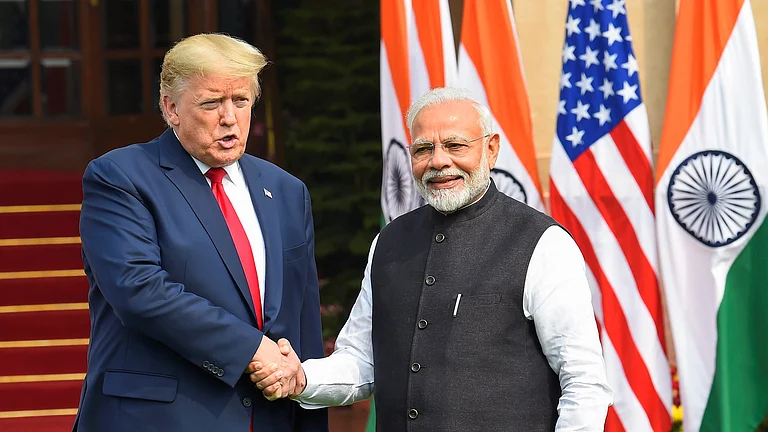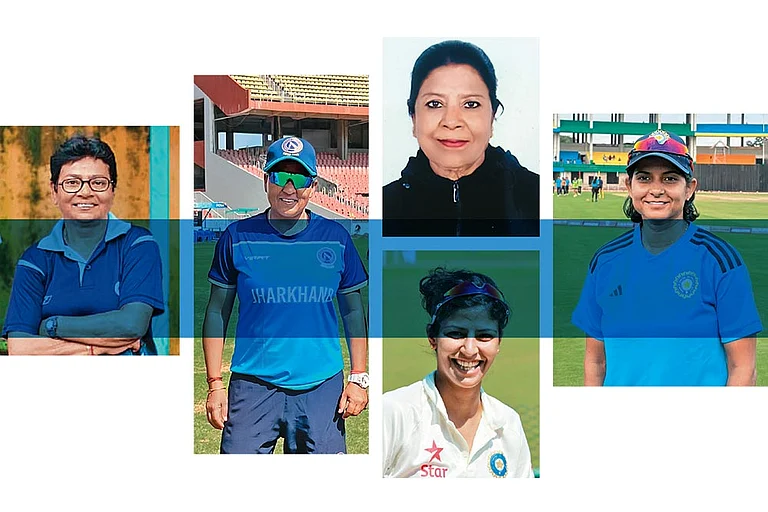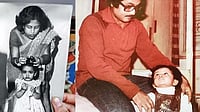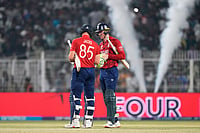On her 40th birthday, Smita Wadhawan, a marketing professional and a single mother, who confesses to being ‘sexless’ for over a decade and occasionally jokes about becoming ‘revirginised’, sought to break the jinx of this ‘menopause’ by pampering herself with a rabbit vibrator—known to offer dual stimulation, to both the G-spot and the clitoris, something she’d read about in magazines like Cosmopolitan and seen in her favorite soap, Sex In The City.
Initially too embarrassed to ask her colleagues exactly how to go about acquiring one, she was finally encouraged by a newly married junior colleague to check out sex toys being sold online. “Lata had a naughty hen party where she was gifted a kinky hamper with everything from handcuffs, arousal oils, erotic lingerie, adult games, delay gels and edible body paints by her girlfriends. She got hooked to these products and regularly buys them now. In fact, she also bragged how, on their first wedding anniversary, her husband had given her a role-play costume of a nurse. And she surprised him with a penis pump, to spice things up between the sheets!” says Smita, who recalls walking the dingy passageways of Palika Bazaar alone in search of sex toys, before she ventured online and found freedom.
“From fur-lined handcuffs, leopard-print hunters and edible underwear, shop attendants claimed they sold ten to 15 sex dolls and more than a dozen vibrators on an average per month. But, I just couldn’t stomach the intrusive stares and the salesmen sleazily suggesting I must invest in breast-enhancing products, pointing at my fitted kurti. One of them pointedly asked me if my ‘pati’ needed lubricants. With a wink, continuing that I must try some sexy gum—the newest aphrodisiacal high...the experience was much weirder than buying a condom over the counter, or asking for a vaginal intimate wash in a departmental store. It was so awkward, and felt dirty in some primitively puritanical way. Like I was the ‘bad’ girl or something… gande khayaalaaton wali…” she rues.
Broaching sex, outside its veiled and suffocatingly ‘normal’ (read narrow) boundaries, is still a bit of a taboo in India, where pleasure requires constant permission and is viewed as moral perversion rather than a fundamental human need. So, while men get away by watching porn and masturbating, a woman doing the same is seen as debauched and dirty. Sex has a purpose here; an unspoken stricture governs it, a socio-religious frame that demands conformism. And it applies predominantly to women, with our biggest validation in marriage and motherhood—virtually a life sentence. And within it, the licence covers only procreative sex.
The e-commerce boom in India, however, has paved the way for a gigantic jump in the sex toys’ market that’s currently expected to scale Rs 2,450 crore. It could even touch a high of Rs 8,700 crore by 2020, predict industry watchers. The trend, initially set off by e-tailers who specialised in adult toys, later saw big players like Amazon and Flipkart invade the space in a big way. Today, sites like ThatsPersonal, ImBesharam (endorsed by none other than Sunny Leone), Oh My Secrets and LoveTreats, which specialise in erotic, adult products, are seeing a 600 per cent growth in terms of visitors and an annual sales jump of 400 per cent.

“India is in the throes of a sexual revolution,” declares Ute Pauline Wiemer, who cofounded LoveTreats last October with her husband and local partner Balaji T. Vijayan. This Bangalore-based sexual wellness startup claims to be growing rapidly with its home base, Mumbai, Hyderabad, Delhi NCR and Chennai as its top markets. Among its highest selling items are—vibrators, flesh lights, body paints and spunky wedding hampers. And half the buyers are women. “Women across India are shattering stereotypes, often against the will of their families and stringent societal norms, to reclaim their sexual rights,” says Ute, who believes something like LoveTreats would add the missing female perspective to the Indian sexual wellness market story, because even as the sexual revolution is driven by women, the market for adult products remains dominated by men and is therefore primarily focused on their pleasure and fantasies.
“Many a time, a woman’s sexual needs, desires and pleasure are not seen as important as women are constantly objectified so as to market products to men. A generous portion of the Indian sexual wellness market consists of products like gels, sprays and creams advertised to change or ‘enhance’ a woman’s body parts. Condom ads are never about promoting safe sex or a healthy partnership; instead, they depict a woman as a seductress or as a lame sexual prop, playing along to a man’s whims and fancies,” adds Ute, who believes conversations around sex will ultimately drive this sexual unbridling amongst Indian women conditioned to closeted, claustrophobic silences. On the site is a free online counselling service and a very popular blog section where the topics are as bold as their treatment—there are unabashed discussions, for instance, of masturbation myths, female orgasms and the like. In a new Pillowtalk’ series, a standard set of six questions are asked on sex and sexuality. These are answered by readers, circulated in close friend circles and then anonymously published. Ute is also working on building an online community where women can share their intimate sexual experiences and get advice, inspiration and support from peers as well as experts such as doctors, sexologists and therapists.
Samir Saraiya, founder of India’s first adult online store ThatsPersonal, cites a survey conducted by the site that discovered 59 per cent of women who’ve bought from them wanted to know about upcoming products. And 41 per cent of the queries and feedback received from women revolved around new product suggestions.
“Women are becoming bolder and more confident, and inquisitive about new products. Women in the 45-plus age category are the second highest buyers of lingerie and maximum women’s arousal products are ordered between 10 pm to 1 am. In Baroda and Pune, traditionally identified as hostel cities, we have more women clientele than men. Amongst women, 23 per cent of sales are for sexy lingerie, followed by 19 per cent for lubricants, 17 per cent for hygiene and arousal, 14 per cent for products for male performance, 12 per cent edible fun, eight per cent condoms, five per cent men’s inner wear and two per cent pleasure rings. And women have a 17 per cent higher basket size than men,” says Saraiya, who used to be head of business development, Microsoft Singapore, and started the site in 2012. ThatsPersonal currently retails over 2,600 products and ships over 18,000 products a month. It has also partnered with 32 global brands for exclusive distribution in India. Besides the metros that form its top markets, it counts Jaipur, Surat, Lucknow, Coimbatore and Chandigarh among its emerging markets.
“Five to ten per cent of global searches for sexual wellness products originate in India. But Indians aren’t comfortable discussing or purchasing such products openly. Partly because our Indian upbringing makes people queasy when it comes to sex and partly due to rigid societal inhibitions, I felt that sexual wellness would be a great category to start our e-commerce site, with an e-delivery model that provides our customers the ability to control the last-mile logistics,” believes Saraiya who recently launched a ‘customer pick-up’ innovation where the customer gets to collect products discreetly from the courier office rather than get them delivered at home or office. About 16-17 per cent of the orders opt for this service. Besides, the site is also building on-ground awareness about its products by tying up with sexologists and gynaecologists in Mumbai to spread awareness among women and couples, with plans to scale this operation across India.
So, does this mean Indian women are finally getting over their prudishness and breaking the omerta code they abided by around the topic of sex? To infuse their sexual horizons with a touch of variety and vitality? To crave a longer, stiffer erection? To indulge in role-swapping? To talk filthy. To touch spontaneously. To tease, tantalisingly. “Recently, we had a woman place a Rs 2 lakh order for her honeymoon and she had us ship the order to Dubai. While we were a bit hesitant to ship directly (since laws in the Middle East are way more complex), we had a teammate fly to Dubai and hand-deliver the products in person. Women customers from metros and Tier 1 cities e-mail us about exactly what they want, and at times we are left wondering how they know more than our own team. Many women also place orders using their husband’s/boyfriend’s cards which indicates the latent desire to experiment is mutual. We have a very famous Tollywood star purchase from us regularly, and while I can’t disclose his name, he is one of our most VIP customers, apart from a lot of reputed Bollywood celebs who have shopped at our store (three of them women),” claims Raj Armani, cofounder of sexual product site ImBesharam. About 38 per cent of its clientele are women, the figure having escalated from a mere 13 per cent when the site started.
“In the past one year, we’ve seen more female customers making purchases for themselves and their partners. We also see their average cart value is between 4-12 k, which is much higher than what men shop for. This means they look for quality and branded options. We also see more sales of LGBT products, toys, undergarments etc, which clearly means a greater audience in that community is getting to know of our brand and discussing it internally, hence the word of mouth that drives more shoppers to our site,” adds Raj, who is emphatic about Sunny Leone being the ‘Perfect example of Besharam’
“Like her, we are also an American brand aimed at and focused on customers in India. Her acceptance in mainstream media, from being Google’s #1 searched person to now bagging lead roles in many popular genre movies, and her other endorsements, are all the perfect spunk needed for our brand impressions and advancements. The changing mindset of the previous generation and the western-influenced mindset of the new generation has raced India to the 21st century lifestyle in the last few years. The timing is perfect and so is the opportunity. Our one-year contract for her to actively promote the brand, and a forever licence to use her endorsement for branding purposes made us pay her one-fourth of our investment in the brand at that time,” he admits.

A vibrator that stimulates both the clitoris and the G-spot; a piece of edible lingerie; a cream for increasing male libido; and a lubricant. A chocolate-flavoured arousal oil for women.
With increasing awareness, economic independence of women and the taboo around talking about physical gratification beginning to weaken, thanks to the influence of popular culture and social media, women’s sexuality is creeping out of the closet. Sex is no longer about men being the protagonist and women being passive recipients.
Every now and then, newspapers talk about Indian courts pointing out that wilfully denying sex to one’s spouse sans any reason is mental cruelty and a reason for divorce. Indian women—who for centuries suffered in lifelong, sex-starved marriages, existing in a kind of mute life condition—are now also beginning to demand gratification. Gender equality has finally come to necessarily entail sexual equality.
But control of women’s sexuality is the oldest ordering principle of society, and any sign of change there is bound to invite a backlash. In February 2015, Snapdeal and Chennai-based Ohmysecret.com were dragged to court by a senior lawyer, Suhaas Joshi, for selling sex toys and accessories. A metropolitan magistrate at Delhi’s Tis Hazari court then directed the Delhi Police to investigate the matter and submit a report. The complaint says the e-commerce marketplace is abetting gay sex and exhibiting obscene products such as lubricants and massagers/vibrators. In a sense, it’s an interesting test-case because the complainant’s intent is to “test the limits of India’s anti-homosexuality law” (Article 377) that criminalises any intercourse against the ‘order of nature’. Joshi feels there’s no clarity on whether products that facilitate such activity are legal.

Raina Mallick (name changed on request), a closet lesbian and lawyer in Mumbai, agrees, but from the other side of the fence. “If Section 377 talks about homosexuality being criminal, how come sex toys or anal lubricants can be being legally imported and sold in the country? I think it would be good to have some clarity on this subject, especially since most Indian laws that regulate this domain are archaic,” says Raina, who herself orders regularly from these sites and is a practitioner of BDSM. “Section 292 of the IPC says there are no legal concerns on the actual sale of sex toys, apparels and ancillary sexual products. However, the concern applies only in the manner in which these sex toys/apparels and related products are displayed and exhibited for sale in India. Under Indian law, ‘obscenity’ is an offence and the police can interpret this clause in many ways. For example, displaying or openly advertising any of these products for sale via vulgar pictures or graphics could land retailers in serious trouble. Although neither the IPC nor the Information Technology Act, 2000, clearly define what ‘obscenity’ is, Section 292 of the IPC and Section 67 of the IT Act (which corresponds to Section 292 of the IPC) relate ‘obscenity’ to signify ‘anything which is lascivious or appeals to the prurient interest, or if its effect is to deprave and corrupt persons.’’’
Ironic though, as Bollywood routinely endorses crass item songs that are unashamedly sexist and stereotype the fairer sex as purely flesh and fodder for men. And popular primetime soaps show in-laws torturing their bahus, and making fun of women and transgenders is par for the course on Comedy Nights With Kapil—Indian television’s most successful comedy programme.
(Sreemoyee Piu Kundu is the best-selling author of Sita’s Curse, India’s first novel of feminist erotica, and writes extensively on sexuality and gender.)



























